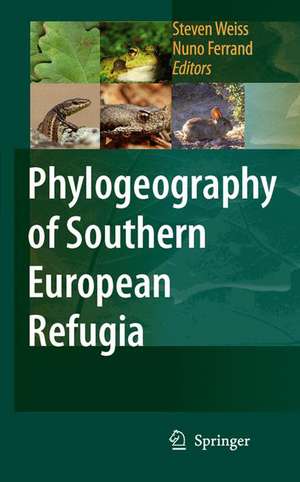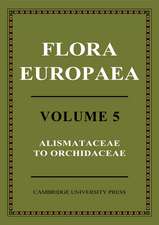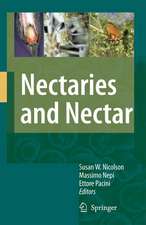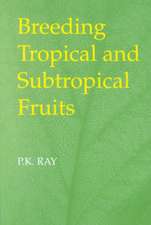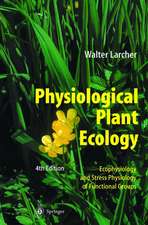Phylogeography of Southern European Refugia: Evolutionary perspectives on the origins and conservation of European biodiversity
Editat de Steven Weiss, Nuno Ferranden Limba Engleză Hardback – 26 oct 2006
| Toate formatele și edițiile | Preț | Express |
|---|---|---|
| Paperback (1) | 948.79 lei 6-8 săpt. | |
| SPRINGER NETHERLANDS – 19 oct 2010 | 948.79 lei 6-8 săpt. | |
| Hardback (1) | 954.93 lei 6-8 săpt. | |
| SPRINGER NETHERLANDS – 26 oct 2006 | 954.93 lei 6-8 săpt. |
Preț: 954.93 lei
Preț vechi: 1164.56 lei
-18% Nou
Puncte Express: 1432
Preț estimativ în valută:
182.72€ • 191.46$ • 151.06£
182.72€ • 191.46$ • 151.06£
Carte tipărită la comandă
Livrare economică 11-25 aprilie
Preluare comenzi: 021 569.72.76
Specificații
ISBN-13: 9781402049033
ISBN-10: 140204903X
Pagini: 388
Ilustrații: IX, 377 p.
Dimensiuni: 155 x 235 x 26 mm
Greutate: 0.72 kg
Ediția:2007
Editura: SPRINGER NETHERLANDS
Colecția Springer
Locul publicării:Dordrecht, Netherlands
ISBN-10: 140204903X
Pagini: 388
Ilustrații: IX, 377 p.
Dimensiuni: 155 x 235 x 26 mm
Greutate: 0.72 kg
Ediția:2007
Editura: SPRINGER NETHERLANDS
Colecția Springer
Locul publicării:Dordrecht, Netherlands
Public țintă
ResearchCuprins
Historical Foundations and Perspectives.- Twenty-five key evolutionary insights from the phylogeographic revolution in population genetics.- Plant phylogeography based on organelle genes: an introduction.- Broad Phylogeographical Studies.- Phylogeography of South European mammals.- Longitudinal patterns in species richness and genetic diversity in European oaks and oak gallwasps.- Emerging Phylogeographical Patterns in a Southern European Refugium: The Iberian Peninsula.- Refugia within Refugia: Patterns of Phylogeographic Concordance in the Iberian Peninsula.- Historical biogeography and conservation of the golden-striped salamander (Chioglossa lusitanica) in northwestern Iberia: integrating ecological, phenotypic and phylogeographic data.- The evolutionary history of the European rabbit (Oryctolagus cuniculus): major patterns of population differentiation and geographic expansion inferred from protein polymorphism.- Patterns of hemoglobin polymorphism [?-globin (HBA) and ?-globin (HBB)] across the contact zone of two distinct phylogeographic lineages of the European rabbit (Oryctolagus cuniculus).- Spatial genetic structure of an explicit glacial refugium of maritime pine (Pinus pinaster Aiton) in southeastern Spain.- First Contributions of Islands and Other Peninsulas to the Phylogeography of Southern Europe.- Endemism in Sardinia.- Are Macaronesian islands refugia of relict plant lineages?: a molecular survey.- Nested clade phylogeographical analysis of barbel (Barbus barbus) mitochondrial DNA variation.- Cross-section of a refugium: genetic diversity of amphibian and reptile populations in the Balkans.- Conclusions.- Current perspectives in phylogeography and the significance of South European refugia in the creation and maintenance of European biodiversity.
Textul de pe ultima copertă
Phylogeography of Southern European Refugia provides the first synthesis of the remarkable diversity, evolutionary complexity, and conservation importance of the flora and fauna in the Mediterranean region, with emphasis on the three major peninsular refugia. The book frames a number of case studies within several introductory and closing chapters that review the development and importance of phylogeographic approaches in evolutionary biology. The book opens with a chapter by the field’s founding father, John Avise, reviewing the 25 evolutionary insights that have arisen from the phylogeographic revolution. Key to this perspective is the notion that the multidisciplinary field of phylogeography is serving as an epistemological bridge between the formerly distinct fields of population genetics and phylogenetics. Next, the foremost leaders of plant phylogeography in Europe, Rémy Petit and Giovanni Vendramin provide an extraordinarily comprehensive and studious review of the history of plant organelle genetics and their application in phylogeography. A closing chapter provides an up-to-date review of the caveats, challenges, and future prospects in phylogeography as a discipline. The volume contains both broad scale and regional phylogeographic studies with original data from a range of organisms including trees, mammals, insects, fish, reptiles, and amphibians. Throughout the volume it is clear that phylogeographic studies, especially in the major peninsulas of southern Europe (Iberia, Italy, the Balkans) have provided enlightening insights into the evolutionary complexity and conservation importance of biota occupying Europe’s most prominent glacial refugia.
Caracteristici
First summary of recent phylogeographical results from Southern European peninsulas Highlights biodiversity importance in Southern Europe for European biota conservation Includes chapters from authorities in phylogeography: John Avise, Remy Petit, Ettore Randi Includes a historical review of organelle genetics in plants Includes a review of the past caveats and future methodological developments in phylogeography
